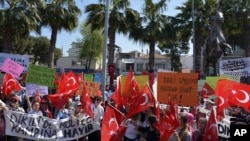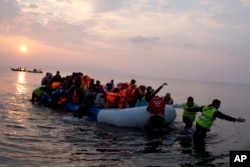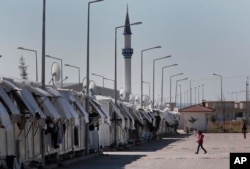The Turkish coast guard intercepted more than 60 migrants and refugees in the Aegean Sea as they tried to reach the Greek island of Lesbos Saturday.
The group, including Syrians, was transported to the western Turkish town of Dikili in compliance with an EU-Turkey deal that takes effect on April 4. Dikili is one of the designated centers for migrants who are sent back to Turkey.
Some 300 anti-migrant protesters in Dikili demonstrated Saturday against registration desks and refugee camps for the rejected asylum seekers in their town.
EU agreement
Turkey agreed with the European Union last month to curb the unprecedented influx of migrants into Europe since World War II. Under the terms of the plan migrants who arrive illegally in Greece from Turkey will be sent back unless their application for asylum is accepted. In return, the EU will resettle thousands of legal Syrian refugees directly from Turkey — one for each Syrian returned from the Greek islands.
Since January, Turkey has been rounding up and forcibly sending about 100 refugees back to Syria nearly every day, according to a new report by Amnesty International.
Amnesty report
The human rights group said Friday this has been an "open secret" in southern Turkey and highlights what it calls the "fatal flaws" in the refugee deal between Turkey and the EU.
"In their desperation to seal their borders, EU leaders have willfully ignored the simplest of facts: Turkey is not a safe country for Syrian refugees and is getting less safe by the day," Amnesty's European and Central Asian Director John Dalhuisen said.
He said the deal to return Syrian refugees and others from Greece - an EU member — to Turkey can only be carried out with the "hardest of hearts" and "blithe disregard for international law."
Amnesty says children and a woman eight months pregnant are among those who were forced back to Syria.







